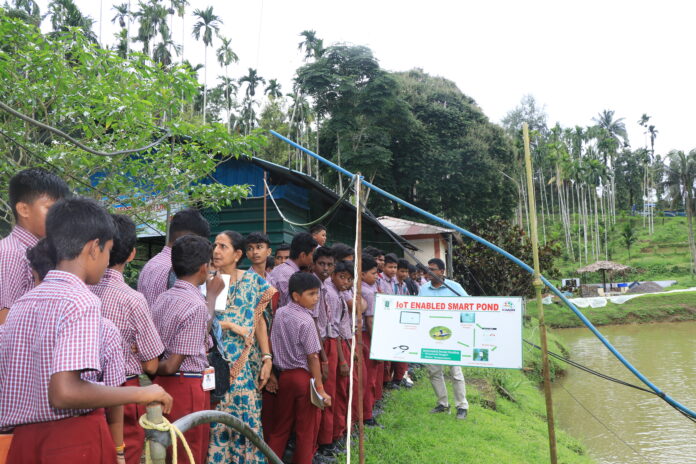Agricultural science and innovation came alive for a group of school students as the Garacharma Research Complex of ICAR-CIARI opened its doors for a study trip. On September 8, 2025, 145 students from Government Senior Secondary School, South Point, accompanied by eight teachers, visited the facility in Sri Vijaya Puram to gain a first-hand understanding of how agricultural research is shaping the future of farming and allied sectors in the islands.
The field exposure visit was designed to introduce the students to the practical aspects of agriculture, fisheries, and animal sciences through guided sessions by scientists and technical experts at the institute. The day began with a presentation by Scientist Chittaranjan Raul, who introduced the group to the Freshwater Ornamental Fish Culture Unit. This facility at Garacharma is dedicated to breeding and rearing aquarium fish, including popular species such as guppies and mollies. Raul explained that ICAR-CIARI has developed complete practice packages for farmers of the islands, providing them with techniques for ornamental fish production that can support income generation and diversify livelihoods.
Dr. Prabhu P, another scientist at the institute, turned the spotlight to rice, a staple crop with immense importance for food security in the islands. He explained the development of salt-tolerant rice varieties, a crucial advancement for coastal and island ecosystems where soil salinity poses a challenge to cultivation. Students were given insights into the process of assessing the disease resistance of rice varieties, highlighting how scientific methods ensure crop resilience in the face of environmental stress.
The study tour also included a visit to the Dr. A. P. J. Abdul Kalam Medicinal Garden, introduced by Technical Officer Kishore Tete. The garden features a wide range of medicinal and therapeutic plants, curated to increase awareness about the biodiversity of the region and its role in traditional and modern healthcare. Students explored the plants while learning about their significance, underscoring the connection between biodiversity conservation and human well-being.
Scientist D. Karunakaran, who coordinated the visit, welcomed the group and delivered a session that placed agriculture within a broader historical and national context. He highlighted India’s journey since Independence, marked by pivotal “revolutions” that transformed food and resource availability. These included the Green Revolution in crops, the White Revolution in milk production, the Blue Revolution in fisheries, and others such as the Yellow, Golden, Silver, and Pink Revolutions, each addressing different aspects of agriculture and allied sectors. Karunakaran emphasized how these milestones collectively secured food security for the country and reshaped rural economies.
Beyond history, the scientist also spoke to the students about the future, pointing to career opportunities that exist in agriculture, fisheries, and animal husbandry. He explained that professional pathways in these fields are not only vital for the islands but are also expanding nationally and globally, offering young people a wide range of options to pursue.
The visit was organized under the leadership of Dr. Eaknath B. Chakurkar, Director of ICAR-CIARI, Sri Vijaya Puram. It was coordinated by a team comprising Scientist D. Karunakaran, Senior Technical Assistant Asma Bibi, Technician Ali Akbar, and Young Professional C. P. Vijayan from the Agricultural Knowledge Management Unit. The effort aimed to ensure that the students’ exposure was both informative and engaging, covering diverse aspects of agricultural research and its applications.
For the students of South Point School, the field visit served as a rare opportunity to step outside classrooms and interact directly with scientists and practitioners. It provided them with insights into cutting-edge research, practical innovations, and future possibilities in agriculture and related fields. The initiative also reinforced the importance of science in addressing local challenges such as soil salinity, biodiversity conservation, and sustainable livelihoods.
As the students returned to their school, the visit left them with a deeper understanding of the role agriculture plays in society and how research institutions like ICAR-CIARI contribute to the advancement of farming practices in the islands. For many, the experience also opened new windows into potential career paths in agricultural sciences, making the visit both educational and aspirational.





